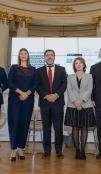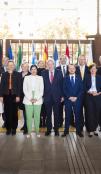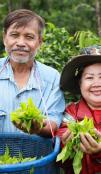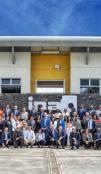Online workshop between the EU and Chile to discuss strategies to combat the looming global food and climate crisis
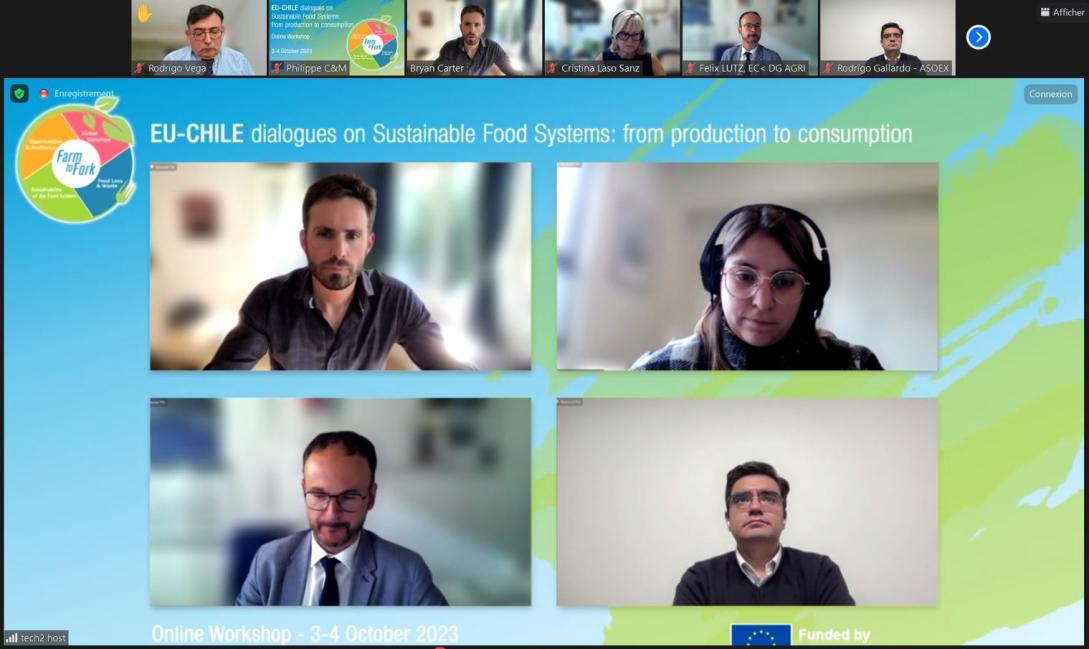
Food systems and climate change are intrinsically linked, and ensuring access to nutritious food for a growing population in a changing climate is a serious and continuing challenge. The COVID-19 pandemic and the invasion of Ukraine have highlighted the vulnerability of food systems and the need to make them more resilient. Joint efforts at regional and global level are needed to enhance the sustainability of our food and to create a system of production and consumption that works in balance with the environment.
As part of its Green Deal, the EU has put in place the Farm to Fork strategy to tackle sustainability and environmental issues across the entire food chain. This EU-funded workshop series supporting Farm to Fork was put in place by the EU to initiate cooperation, exchange best practices and share experiences on attaining sustainable food systems.
As the last workshop held in the scope of the International Policy Dialogue on Sustainable Food Systems, the event demonstrated the willingness to seek common ground and areas for cooperation to improve partnership between the EU and Chile.
In the opening session, Cristina Laso Sanz, Deputy Head of Unit A5 - DG SANTE, European Commission, stressed the importance of working together to achieve common goals, rather than entering into a blame game. This was further underpinned by Felix Lutz, DG Agriculture and Rural Development, European Commission, who stated that “with Chile, there has always been a lot of shared perceptions.[…] Slowly but surely we are moving to the next stage but it is important that we do it in a way that doesn’t complicate but eases relations.”
At the same time, María José Pizarro, Head of Sustainability and Climate Change, ODEPA Chile, stressed that although Chile faces similar challenges to those of the EU, the reality on the ground is sometimes very different, where many of the private sector producers are small-scale. Referring to the EU, she said that “you have already walked the path, and we can learn from that and face these challenges together”.
During the session on the importance of research and innovation for promoting sustainable agriculture, with a particular focus of the contribution of R&I to mitigate and to adapt to effects of climate change and preserve biodiversity, the EU representatives extended a hand to continue collaborating on common research efforts. The difficulty of transferring knowledge developed from research to farmers was commonly agreed upon, and the Chilean representative, Iris Lobos, Director of the Agricultural Research Institute (INIA), expressed a willingness to learn from the EU in this area.
The EU representatives Matthias Leonhard Maier and Susana Gaona Saez from DG AGRI of the European Commission particularly stressed the importance of having a bottom-up driven approach for research and involve more the farmers from day zero in the research projects.
The exchange on food waste and loss revealed that, while this is an area that was considered to be rather missing in its climate agenda, nevertheless Chile is now generally recognized to take the lead in this field across Latin America, which was very much welcomed from the side of the EU. The session also saw an interesting exchange on potential solutions for tackling this problem. The EU, apart from new legislative rules and flexibility in it, also puts a lot of work in maintaining a platform to address this issue – a presentation was given on how this contributes to the reduction of food loss and waste.
It was concluded that the workshop had exceeded the expectations of many of the participants, where all speakers largely agreed both on the challenges related to climate change and food security, as well as on the objectives. There was also a compromise from both sides that not doing anything is not an option. Both the EU and Chile agreed on the importance of complying with compromises, to take actions to plan for next steps, and in so doing respecting the three sustainability pillars – economic, environmental and social.
It was also considered a must that both the private and public sector stakeholders acknowledge to participate in the process to move forward. The EU and Chile agreed to continue exchanging on good practices, which was considered an essential step for maintaining good relations. In addition, further deepening the exchange on research and on how to share research findings with those on the ground can constitute an important pillar of such exchange. To avoid trade disputes, it was stressed that problems must be anticipated to solve them together, which will then contribute to the strengthening of the relationship between the EU and Chile.
Background information:
The adjustment of food systems, which were also documented and called upon in the UN Food Systems Summit in September 2021, needs to take into account the various contextual differences across the planet regarding cross cutting issues such as land degradation or food loss that ultimately affect how food is produced, processed, transported and consumed.
The question of sustainable food systems goes beyond the means of production and is also subjected to several nutrition challenges such as undernutrition and hunger. These challenges persist while new and multiple forms of malnutrition rise. In particular, food-borne non-communicable diseases such as cancer, obesity, and cardiovascular conditions put pressure on people and health systems.
Although global awareness grows, commitments are made and some solutions are designed and implemented, there is still a need to rapidly and firmly put more actions in place and to foster a worldwide cooperation and coordination.
This series of regional and country-focused workshops is funded by the European Commission’s Service for Foreign Policy Instruments to support implementation of the Farm to Fork Strategy, which is the EU plan to contribute to solve food challenges, and, to this end, proposes pathways for change towards sustainability that provides environmental, health, social and economic benefits.
More details of the European Commission’s Farm to Fork Strategy are available here and on Social Media channels with the tags:
@EU_FPI
#EUForeignPolicy

